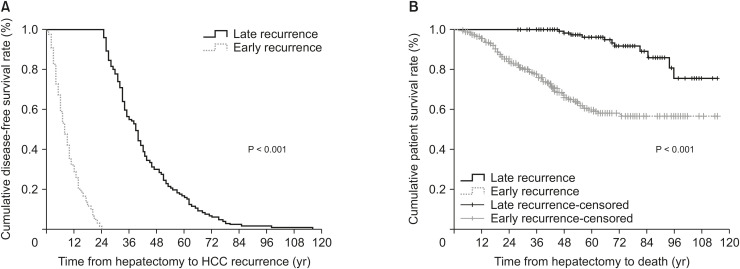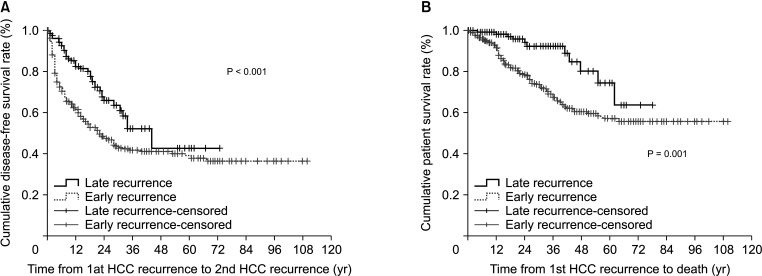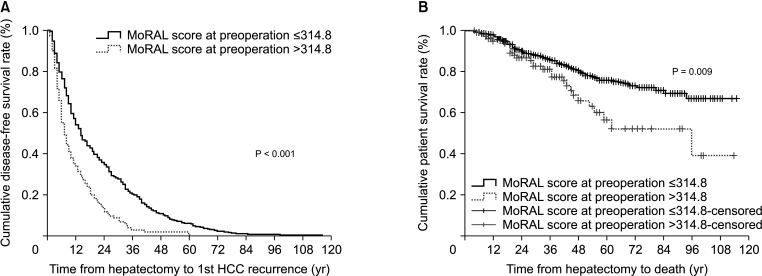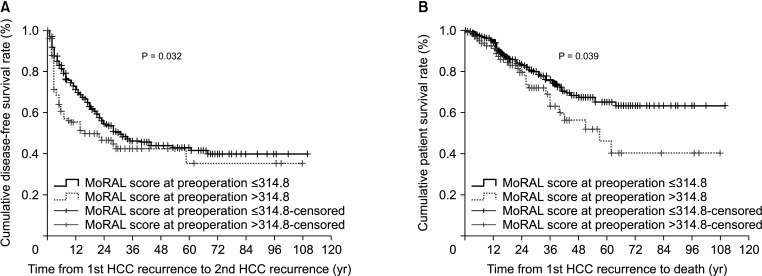Ann Surg Treat Res.
2022 Mar;102(3):131-138. 10.4174/astr.2022.102.3.131.
Validation for models for tumor recurrence after liver transplantation in hepatectomy patients
- Affiliations
-
- 1Sungkyunkwan University School of Medicine, Seoul, Korea
- 2Department of Surgery, Samsung Medical Center, Sungkyunkwan University School of Medicine, Seoul, Korea
- 3Department of Surgery, Seoul National University College of Medicine, Seoul, Korea
- KMID: 2526933
- DOI: http://doi.org/10.4174/astr.2022.102.3.131
Abstract
- Purpose
Early recurrence of hepatocellular carcinoma (HCC) remains a challenging issue after hepatic resection (HR) because of the associated poor prognosis. Models for tumor recurrence after liver transplantation (MoRAL) have been designed to predict tumor recurrence in HCC patients in the liver transplantation setting. This study aimed to validate the predictability of MoRAL for HCC recurrence or patient death and to evaluate the predictors of early HCC recurrence in hepatectomy patients with treatment-naïve solitary HCC.
Methods
This study included 443 patients with HCC recurrence after HR from January 2005 to December 2011. Patients were stratified into early recurrence (n = 312) and late recurrence (n = 131) groups according to the development of recurrence either within or more than 2 years after hepatectomy.
Results
The median levels of alpha-fetoprotein and protein induced by vitamin K absence-II and the median MoRAL score were significantly higher in the early recurrence group than in the late recurrence group. Regarding pathologic characteristics, the median tumor size, prevalence of tumor grade 3 or 4, microvascular invasion, presence of tumor necrosis, and macrovascular invasion in the early recurrence group were greater than those in the late recurrence group. Multivariate analysis showed that tumor grade 3 or 4, microvascular invasion, and high preoperative MoRAL score were predisposing factors for early HCC recurrence after HR.
Conclusion
The MoRAL score can be used to predict early recurrence in patients with HCC who undergo curative HR. Using this model, other treatments could be considered for patients with early recurrence predicted after HR.
Figure
Reference
-
1. Lee YB, Ha Y, Chon YE, Kim MN, Lee JH, Park H, et al. Association between hepatic steatosis and the development of hepatocellular carcinoma in patients with chronic hepatitis B. Clin Mol Hepatol. 2019; 25:52–64. PMID: 30360031.
Article2. Sartorius K, Sartorius B, Aldous C, Govender PS, Madiba TE. Global and country underestimation of hepatocellular carcinoma (HCC) in 2012 and its implications. Cancer Epidemiol. 2015; 39:284–290. PMID: 25922178.
Article3. Yu SJ. A concise review of updated guidelines regarding the management of hepatocellular carcinoma around the world: 2010-2016. Clin Mol Hepatol. 2016; 22:7–17. PMID: 27044761.
Article4. Kim JM, Joh JW, Yi NJ, Choi GS, Kwon C, Lee KW, et al. Living donor liver transplantation should be cautiously considered as initial treatment in recurrent hepatocellular carcinoma within the Milan criteria after curative liver resection. Ann Transl Med. 2020; 8:288. PMID: 32355732.
Article5. Shah SA, Greig PD, Gallinger S, Cattral MS, Dixon E, Kim RD, et al. Factors associated with early recurrence after resection for hepatocellular carcinoma and outcomes. J Am Coll Surg. 2006; 202:275–283. PMID: 16427553.
Article6. Jung SM, Kim JM, Choi GS, Kwon CH, Yi NJ, Lee KW, et al. Characteristics of early recurrence after curative liver resection for solitary hepatocellular carcinoma. J Gastrointest Surg. 2019; 23:304–311. PMID: 30215196.
Article7. Kim JM, Kwon C, Joh JW, Sinn DH, Choi GS, Paik SW. Prognosis of preoperative positron emission tomography uptake in hepatectomy patients. Ann Surg Treat Res. 2018; 94:183–189. PMID: 29629352.
Article8. Kim JM, Kwon CH, Joh JW, Park JB, Lee JH, Kim SJ, et al. Outcomes after curative hepatectomy in patients with non-B non-C hepatocellular carcinoma and hepatitis B virus hepatocellular carcinoma from non-cirrhotic liver. J Surg Oncol. 2014; 110:976–981. PMID: 25171344.
Article9. Kim JM, Kwon CH, Joh JW, Park JB, Lee JH, Kim SJ, et al. Differences between hepatocellular carcinoma and hepatitis B virus infection in patients with and without cirrhosis. Ann Surg Oncol. 2014; 21:458–465. PMID: 24132624.
Article10. Kim JM, Hyuck C, Kwon D, Joh JW, Lee JH, Paik SW, et al. Protein induced by vitamin K antagonist-II (PIVKA-II) is a reliable prognostic factor in small hepatocellular carcinoma. World J Surg. 2013; 37:1371–1378. PMID: 23443153.
Article11. Lee JH, Cho Y, Kim HY, Cho EJ, Lee DH, Yu SJ, et al. Serum tumor markers provide refined prognostication in selecting liver transplantation candidate for hepatocellular carcinoma patients beyond the Milan criteria. Ann Surg. 2016; 263:842–850. PMID: 26779979.
Article12. Korean Liver Cancer Association. National Cancer Center. 2018 Korean Liver Cancer Association-National Cancer Center Korea practice guidelines for the management of hepatocellular carcinoma. Gut Liver. 2019; 13:227–299. PMID: 31060120.13. Heimbach JK, Kulik LM, Finn RS, Sirlin CB, Abecassis MM, Roberts LR, et al. AASLD guidelines for the treatment of hepatocellular carcinoma. Hepatology. 2018; 67:358–380. PMID: 28130846.
Article14. Trevisani F, D'Intino PE, Morselli-Labate AM, Mazzella G, Accogli E, Caraceni P, et al. Serum alpha-fetoprotein for diagnosis of hepatocellular carcinoma in patients with chronic liver disease: influence of HBsAg and anti-HCV status. J Hepatol. 2001; 34:570–575. PMID: 11394657.
Article15. Hoshida Y, Toffanin S, Lachenmayer A, Villanueva A, Minguez B, Llovet JM. Molecular classification and novel targets in hepatocellular carcinoma: recent advancements. Semin Liver Dis. 2010; 30:35–51. PMID: 20175032.
Article16. Okuwaki Y, Nakazawa T, Shibuya A, Ono K, Hidaka H, Watanabe M, et al. Intrahepatic distant recurrence after radiofrequency ablation for a single small hepatocellular carcinoma: risk factors and patterns. J Gastroenterol. 2008; 43:71–78. PMID: 18297439.
Article17. Poté N, Cauchy F, Albuquerque M, Voitot H, Belghiti J, Castera L, et al. Performance of PIVKA-II for early hepatocellular carcinoma diagnosis and prediction of microvascular invasion. J Hepatol. 2015; 62:848–854. PMID: 25450201.
Article18. Bae HM, Lee JH, Yoon JH, Kim YJ, Heo DS, Lee HS. Protein induced by vitamin K absence or antagonist-II production is a strong predictive marker for extrahepatic metastases in early hepatocellular carcinoma: a prospective evaluation. BMC Cancer. 2011; 11:435. PMID: 21985636.
Article19. Chang Y, Cho Y, Lee JH, Lee YB, Cho EJ, Yu SJ, et al. Comparison of models for tumor recurrence after liver transplantation for the patients with hepatocellular carcinoma: a multicenter long-term follow-up study. Cancers (Basel). 2019; 11:1295.
Article20. Nam JY, Lee JH, Bae J, Chang Y, Cho Y, Sinn DH, et al. Novel model to predict HCC recurrence after liver transplantation obtained using deep learning: a multicenter study. Cancers (Basel). 2020; 12:2791.
Article
- Full Text Links
- Actions
-
Cited
- CITED
-
- Close
- Share
- Similar articles
-
- Fifteen-year-long journey with hepatocellular carcinoma from diagnosis during pregnancy to recurrence after liver transplantation: A case report of intractable tumor recurrence
- Two-stage liver transplantation in a surgically complicated liver failure patient after hepatic tumor resection: A case report
- Results of Hepatectomy as First Treatment for Hepatocellular Carcinoma within the Milan Criteria with Preserved Liver Function
- Recipient hepatectomy under total hepatic vascular exclusion to prevent hepatocellular carcinoma spread in living donor liver transplantation
- A Single Center Experience for a Feasibility of Totally Laparoscopic Living Donor Right Hepatectomy





